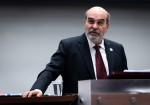A director-general of the United Nations said institutions must address issues like climate change and the overconsumption of unhealthy food to tackle global malnutrition.
Jose Graziano da Silva, the director-general of the Food and Agriculture Organization of the UN, said at an event hosted Friday by the UCLA Resnick Center for Food Law and Policy and the Promise Institute for Human Rights at UCLA School of Law that government policies must adapt to changes in the production and consumption of food which increase both hunger and obesity globally.
Climate change worsens conditions for food security by creating uncertainty in food production, he said.
“We are back to when we are hunters and gatherers,” Graziano da Silva said. “Millions of years of agricultural development is upside-down.”
Food production in many regions of the world is diminishing due to unpredictable weather patterns, he said. A high amount of food waste also exacerbates the problem of widespread hunger, Graziano da Silva added.
“One-third of all the food produced is wasted from the production to the consumer side,” Graziano da Silva said.
Graziano da Silva called for institutional adaptations to cope with issues that affect global food production and distribution.
“We are in the moment of quick transformation – new progress, new ways of distributing food. What is lacking behind is the institutions,” he said. “You cannot prevent droughts from happening, but you can prevent drought from turning into famine.”
Julia Feygelman, a graduate student in public health, said she thought the talk was too general and did not provide any tangible solutions to the issues presented.
“It is good that these topics are being talked about, but it’s disappointing to see that the talks are not being translated into action,” she said.
Obesity is another form of malnutrition that affects a large percentage of the global population, Graziano da Silva said.
“Obesity is everywhere, facing all countries, affecting all people. It’s an epidemic,” he said. “It’s a real problem and we are not taking it seriously.”
Malnutrition costs $3.5 trillion per year globally, Graziano da Silva said, which is around 3 percent of the world’s gross domestic product.
“That’s more than the money we dispense on conflict and terrorist combat. It’s not about hunger anymore, it’s all forms of malnutrition,” he said.
Obesity is also linked with the changing ways that people consume food, Graziano da Silva said. He said people’s eating habits are changing as they cook less and eat out more often, a factor that contributes to the rising rate of obesity.
“We externalize the most important thing in our life: food. We leave it up to McDonald’s,” he said. “(Food consumption habits) are completely different from how we ate 10 years ago.”
He added obesity should be treated as a public health issue, not an individual’s problem.
“We don’t have any one international law or regulation to deal with that,” Graziano da Silva said. “We need to move from food safety to healthy food recommendations.”
He added he thinks these recommendations should be tailored to the local needs and cultural traditions of individual countries.
Asli Bali, the faculty director of the Promise Institute of Human Rights, said malnutrition extensively impacts the Los Angeles community as well.
“Food insecurity and obesity, the two sides of the coin, reside here in our community,” she said.
She said she thinks UCLA, as a university, should consider how it could generate knowledge and raise awareness of malnutrition in the local and global community.
